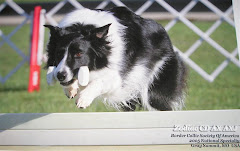I spent a few days at a veterinary conference this weekend and learned a few things I wanted to share.
First of all, most people with herding dogs have heard of the MDR1 gene mutation causing Ivermectin sensitivity. Data from the lab at Washington state-where they run the test for the mutation-showed that only 15% of Shelties and less than 5% of border collies test positive for the mutation. Conversely 70% of collies and 50% of Aussies are positive. With this new info in mind it's important to remember that this is only a problem when dogs are treated with high levels of ivermectin-as in the demodex dose. No dogs are sensitive to the dose of Ivermectin in Heartgard. Also bear in mind that there are other mechanisms of ivermectin toxicosis and any dog being treated for demodex should slowly have the dose increased and monitored for any side effects.
I also learned that of dogs with Methicillin resistant staph infections only 4% have Staph aureus, or human staph. The rest have Staph pseudintermedius, or dog staph. Dog staph is not transmissable to people except when they are very immunocompromised. So while this may be potentially bad for your dog he is unlikely to give it to you.
And finally, for a number of reasons related to tick biology those of us living in tick country will continue to have troubble controlling them. I now feel very lucky that we don't have a big tick problem in our yard.
.jpg)



.jpg)



6 comments:
Sounds like a lot of interesting topics. I wish we weren't stuck with ticks, though.
Thank you for posting that info on invermectin and shelties. We have read not to give shelties heartgard but our vet said it was ok and then we read a lot on a sheltie forum (http://www.sheltieforums.com/showthread.php?t=4274)about it and got panicked again. So your information makes us feel better that our vet is not uninformed and I should be ok on the heartgard dosage of invermectin.
It's really difficult to sort through all the info out there. We're also worrying about % of protein in my kibble - Instinct Chicken grain-free - it's 42% which my vet said was ok but on the forum they were saying anything over 32% could cause the kidneys to work too hard. Any thoughts on that?
Ricky-that is a great question. I've heard the same thing as well so I took a little time to look into it and see it I could find the answer. Unfortunately it seems no one has ever proven this one way or the other. What we do know is that dogs don't need that high of a protein content and any protein above the required amount is just excess calories and can ultimately become fat. So it's kind of an expensive way to get excess calories into the pet! I also noted on Instinct's website that the food is formulated for "all life stages." This esentially means it meets the requirements for growing dogs, i.e. puppies! For me, I know my adult dogs don't need puppy food any more than I need to eat like a growing teenager so I feed them a food with a "normal" amount of protein and then I also don't need to worry about whether or not there will be a problem for the kidneys. Also when reading labels it is necessary to account for the percent moisture,etc. But overall I think a kibbled food with 42% protein on the label will calculate out higher than is necessary for an adult dog. Nutrition is so very confusing, even to vets, but that's my two cents. Hope it helps!
I never knew about the invermectin. But I've always used interceptor not heartguard.
No surprise here that ticks will continue to be a problem. Those critters won't die, even when it is 20 degrees out! I swear they are from the dinosaur age.
Thanks, Nicki, for writing such a great response and for taking the time to research it too! So Instinct probably is too high in protein then. Funny how there is all this pressure to feed your dog grain-free kibble (if you're feeding kibble) and then the grain-free is so high in protein. I am doing well on Instinct but I used to eat the Prairie (the formula with the good grains) that Nature's Variety makes and I did well on that too (shiny coat, good poops, etc). So maybe we'll switch back and then feel better about the protein.
Thanks for all the great info! I had my aussie test for the invermectin sensitivity when he was a puppy and we are thankful he's negative! But gosh, hearing that 50% of aussies are testing positive is disheartening.
Post a Comment